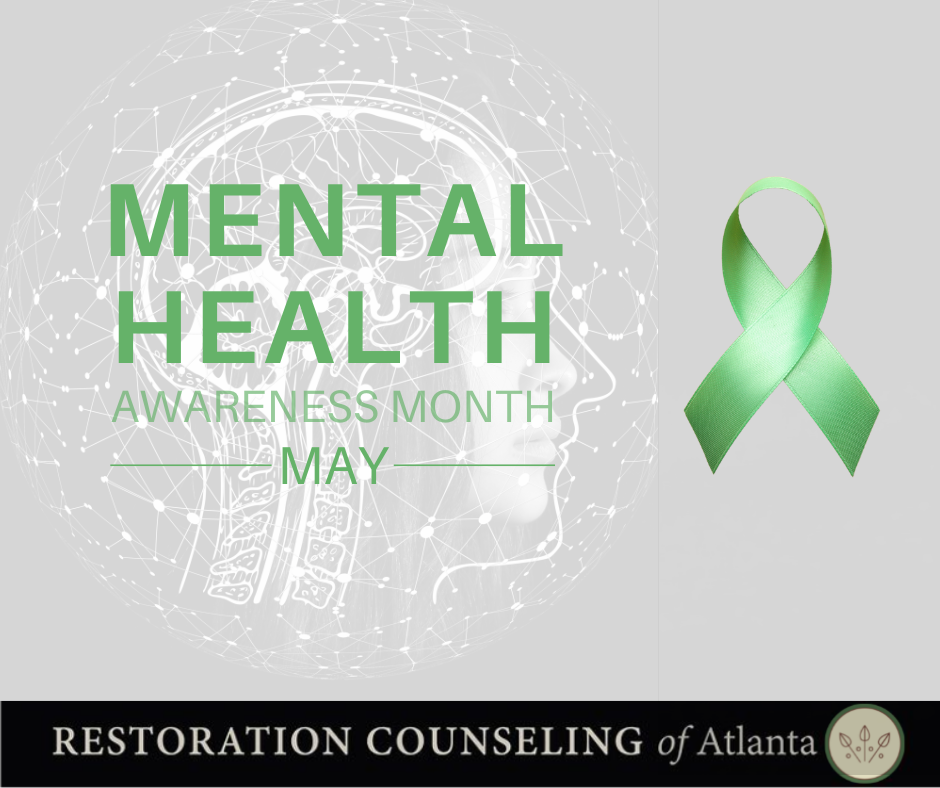In 1949 the National Association of Mental Health, now called Mental Health America, declared May Mental Health Awareness Month. It is a month set aside for us to intentionally bring awareness, fight stigma, and voice support for mental health-related issues. Staying mentally well is important. Our mental health impacts every aspect of our lives. When we are well, our relationships flourish more easily, we can be more productive at work and school, and our bodies are better able to fight off illness. Unfortunately, just like physical health, mental health can decline. When mental illness results, individuals, families, and communities suffer.
Feeling Mentally Unwell? You’re not alone.
Mental illness is very common. Since the beginning of the Covid 19 pandemic, levels of anxiety, depression, and substance use have been on the rise. A recent study on adult mental health in the United States indicated that at least 21% of adult Americans experienced one mental illness, 55% of Americans with mental illness did not receive any treatment, and 12.1 million people reported serious thoughts of suicide (Warren, 2023). A study of American adolescents revealed that 42% felt persistently sad, 29% experienced mental illness, and 1 in 5 students seriously considered attempting suicide (CDC, 2023). Mental illness is a serious problem we must address.
A Little Help Goes a Long Way!
This May (and throughout the year), join people across the nation in taking action to encourage mental health and help those who are suffering from mental illness. Consider:
1. Ensuring you are mentally fit. Take a moment to honestly evaluate your mental well-being. If you feel there is room for improvement, contact a counselor who can assess your level of wellness and help you get on the path to greater health.
2. Using your influence in the community to educate others about mental health. You can wear a green ribbon, the international symbol for mental health awareness, as a conversation starter, volunteer for a mental health-related organization or run a mental health awareness program for your business. The following organizations have programs, materials, and additional ideas to help you get started.
National Alliance on Mental Illness
Substance Abuse and Mental Health Services Administration
3. Donating financial support for people who cannot pay for mental health services. The Johnny Foundation is an organization that provides financial assistance for counseling services.
4. Getting to know your community. If you suspect that someone you know is beginning to struggle with mental illness, start a conversation and check in with them. If you are concerned that someone is in danger, know where to turn:
- 911 Emergency Medical Help
- 988 Suicide Hotline
- 1-800-715-4225 24-Hour Georgia Crisis and Access Line
The more people get involved in mental health awareness, the sooner we can reduce stigma, connect people to help, and heal our communities. A little help goes a long way!
References and additional information:
Center for Disease Control and Prevention. 2023. Poor Mental Health is a Problem for Adolescents. Retrieved from CDC.org
Mental Health America. 2023. MHAnational.org.
Warren, Darice.2023. The State of Mental Health in America: Adult Prevalence and Access to Care. Next Step Solutions. Retrieved from: nssbehavioralhealth.com
 Written by Andrea Brandt, NCC, APC
Written by Andrea Brandt, NCC, APC
andrea@restorationcounselingatl.com, ext. 154
Online Counseling
Andrea Brandt works with adults who desire freedom and healing from the impact of addiction, obsessive-compulsive disorder, anxiety, and depression. She uses EMDR to help clients reduce the urge to engage in behaviors that they want to stop, and she treats the underlying trauma and beliefs that fuel unhealthy behaviors and thinking. On the journey toward healing, Andrea guides clients in understanding and managing emotions, creating, communicating, and maintaining healthy boundaries, and growing healthy relationships. Andrea has specialized training in EMDR, Addictions, and Exposure and Response Prevention. She sees clients via telemental health from her boat office, Knot 2 Late, and believes that it is never too late to embrace change, heal, and grow.

